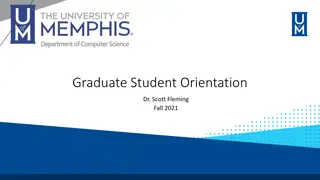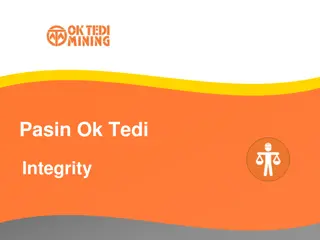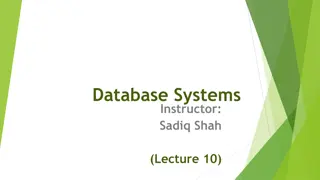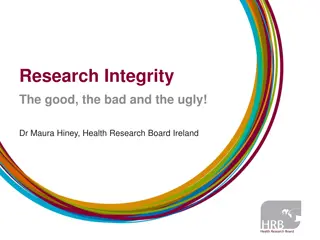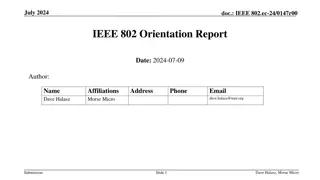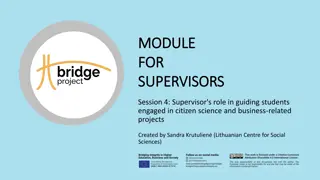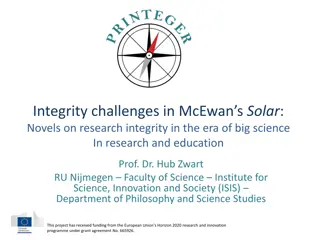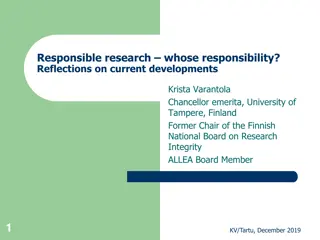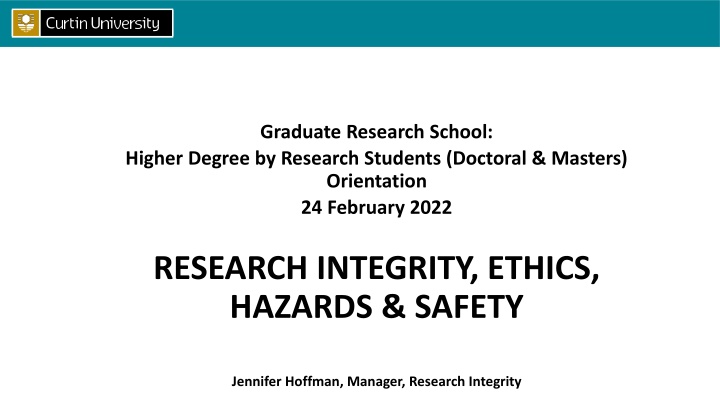
Responsible Conduct of Research at Curtin University
Explore the principles of responsible research conduct, ethics, and safety guidelines for higher degree research students at Curtin University. Understand your responsibilities as a researcher, compliance with research standards, and global research policies to uphold integrity in your research endeavors.
Download Presentation

Please find below an Image/Link to download the presentation.
The content on the website is provided AS IS for your information and personal use only. It may not be sold, licensed, or shared on other websites without obtaining consent from the author. If you encounter any issues during the download, it is possible that the publisher has removed the file from their server.
You are allowed to download the files provided on this website for personal or commercial use, subject to the condition that they are used lawfully. All files are the property of their respective owners.
The content on the website is provided AS IS for your information and personal use only. It may not be sold, licensed, or shared on other websites without obtaining consent from the author.
E N D
Presentation Transcript
ROC structure, support & services - generalGraduate Research School: Higher Degree by Research Students (Doctoral & Masters) Orientation 24 February 2022 RESEARCH INTEGRITY, ETHICS, HAZARDS & SAFETY Jennifer Hoffman, Manager, Research Integrity
Higher Degree Research: Welcome to the World of Research Integrity
Principles of Responsible Research Conduct for research participants, the wider community, animals and the environment. in the development, undertaking and reporting of research. Respect Honesty of the right of Aboriginal and Torres Strait Islander peoples to be engaged in research that affects or is of particular significance to them. in the development, undertaking and reporting of research. Recognition Rigour in declaring interests and reporting research methodology, data and findings. for the development, undertaking and reporting of research. Accountability Transparency in the treatment of others. Promotion Fairness of responsible research practices.
Responsibilities as a Curtin HDR student There are 29 responsibilities of researchers under The Australian Code for the Responsible Conduct of Research In addition there are a number of other responsibilities under legislation, regulations and Curtin policies and procedures It is your responsibility to understand all of your obligations and to comply with them https://www.nhmrc.gov.au/about-us/publications/australian- code-responsible-conduct-research-2018
Which research policy applies? Curtin University Responsible Conduct of Research Policy: 3.1. Researchers will comply with the research standards as set out by The Australian Code for the Responsible Conduct of Research. 3.2. The Code sets out research standards through the principles of responsible research conduct and the responsibilities of Curtin University and researchers. Where the researcher is a student at this university Statute No. 10 Student Discipline and the associated rules also apply. 3.3. If undertaking research at a Curtin global campus, or research in another non-Australian location, researchers will also comply with that country s research code. Where there is a difference in standards, researchers will comply with the higher standard.
Research Initiation Guide The Research Initiation Guide (RIG) is a tool to help you understand your responsibilities and legal obligations as a researcher integrity (in publishing, collaborating etc); ethics; safety biohazards, radiation; chemical hazards; Defence Trade Controls. It provides direction on how you can meet these responsibilities and obligations When starting a new project, you must use the RIG help you understand any permits, licences or approvals you may need before commencing your research https://rig.curtin.edu.au/home
Research Initiation Guide To help you to identify and obtain the permissions you need to get before you can start work. What is the purpose of the RIG? To train you about how to safely handle any hazardous research materials. To train you about how to protect yourself, and your research participants, from the impacts of your research. Who should complete it? HDR Students. Research Staff (who control the research methods used). Supervisors of Honours Students. Teaching Staff (who control course content). When should it be completed? Complete a RIG during the early planning stages of any new work and review it whenever your work changes. HDR Students - complete a RIG during your Candidacy planning process and annually review it at each milestone. Research Staff - complete a RIG during the early planning stage of your research before seeking funding and review it whenever you vary your project. Supervisors of Honours Students - complete a RIG if you are planning for your Honours Student to do a project outside the scope of your normal research. Teaching Staff complete a RIG during the early course development and review it whenever you update your course. Why should you use it? Many of the materials and techniques used for research and teaching are regulated by the Australian Government and require a permission to be granted before you can use those materials or techniques. If you don t get the required permissions before you start work then you will have broken the law and may be prosecuted. https://rig.curtin.edu.au/home
Research Misconduct Research misconduct occurs when researchers fail to meet their obligations and responsibilities and do not conduct research with integrity People, animals, environment Impacts Society University Retraction of papers and research outputs Return of research funds Breakdown of research collaborations Sanctions such as demotion, termination Reputational damage Researcher
Research Integrity hot spots for HDR Students First principles: honesty, rigour, fairness Managing Ethics Authorship
Managing Ethics Ethics mindset particularly for non-traditional ethics areas Approved protocols are strict Can possibly vary ethics protocols but defects cannot be cured Dealing with InfoEd
Authorship GHOSTING, GIFTING, FAILING TO INCLUDE AUTHORS, ORDER OF AUTHORS... Section 5 of the Code: Attribution of authorship depends to some extent on the discipline, but in all cases, authorship must be based on substantial contributions in a combination of: conception and design of the project; analysis and interpretation of research data; and drafting significant parts of the work or critically revising it so as to contribute to the interpretation
Contact us Research Ethics Team Animal Facility Team Team Leader Ethics: Senior Research Services Officer: Heather Johnson Research Services Officer : Amy Bowater Animal Welfare Officer: Animal Technician: Dr Tara Pike Dr Emily Barrick Carolyn Doyle Doug Castle Diana Dalla Costa Stephanie Holmquest Pam Lee P: x3469 E: L_ResearchFacility@curtin.edu.au Human Ethics P: x9223 E: ROC-ethics@curtin.edu.au Animal Ethics P: x9223 E: aec@curtin.edu.au Research Integrity Clinical Trials Clinical Research Advisor: Anneli Robbshaw Manager Research Integrity: Jennifer Hoffman P: x9292 E: ROC-clinicaltrials@curtin.edu.au P: x7093 E: research-integrity@curtin.edu.au



